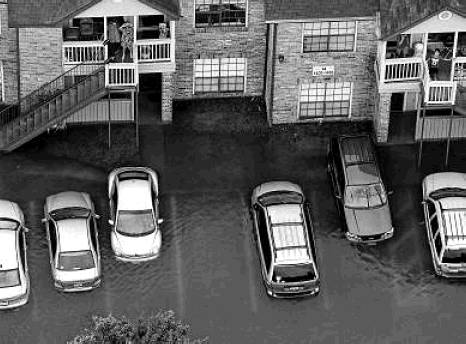Landlords must tell renters of flood risk
New state law was inspired by tenants’ plights after Harvey
By Jasper Scherer STAFF WRITER
After Hurricane Harvey slammed Harris County in August 2017, state Rep. Armando Walle waited for the floodwaters to recede, then hopped in his pickup truck and began surveying the damage near his northeast Houston home.
As he drove through Aldine, Greenspoint and nearby neighborhoods, Walle was struck by how many people he saw, apparently renters blindsided by the storm, lugging their destroyed belongings to the curb. The sight that reminded him of the Memorial Day floods in 2015 and the Tax Day floods in 2016, when he’d seen the same thing occurring in those same areas.
“I went and spoke to a lot of those folks that had first-floor apartment units that were wiped away,” said Walle, D-Houston. “And in talking to them, they had no idea that these properties could flood so drastically.”
Starting Jan. 1, under a bill authored by Walle and approved by state lawmakers last spring, landlords must tell prospective tenants if their property is located inside a 100-year flood plain or if it was damaged by flooding within the last five years. The new law, signed by Gov. Greg Abbott in June, brings renters in line with home-buyers after the Legislature enacted similar requirements for sellers in 2019.
The imbalance in the law had created a scenario, criticized by housing advocates as inherently unfair, in which landlords would receive notice they were buying a flood-prone property, then could turn around and rent it out without giving the same notice to their tenants.
The 100-year flood plain is supposed to serve as a warning to homebuyers and renters who face the highest risk of flooding, covering areas that would be swamped by storms that, in theory, have a 1 percent chance of occurring each year.
In recent storms, however, the majority of flood-damaged homes in Harris County have been located outside the 100-year floodplain, including more than three-quarters of the 204,000 homes and apartment buildings that flooded during Harvey, a Houston Chronicle investigation found. The Federal Emergency Management Agency, which approves locally designed flood maps, has estimated that only about 20 percent of those properties were covered by flood insurance.
‘Just common sense’
Local and federal officials are working to redraw the county’s flood maps, with preliminary maps slated for release next year. Even under the outdated maps, however, Walle said the new disclosure law will apply to flood-prone homes that fall both inside and outside the 100-year floodplain, because landlords must also notify tenants if the property has been damaged by flooding within the last five years.
“I could walk to Greens Bayou from my house,” Walle said. “I’m not in a floodplain, but a couple streets over, you’re in a floodplain. So, it’s just common sense. You can’t just take the 100-year floodplain as the end-all, be-all.”
The law is largely aimed at encouraging renters to buy flood insurance, or at least notifying them of the option. Harris County does not track how many homeowners and renters have flood insurance policies, though County Judge Lina Hidalgo has estimated that a large number remain uncovered, even after repeated warnings.
Renters live in nearly half of the occupied housing units in Harris County, a total that rises to roughly three in five within the city of Houston.
Notice required
Walle’s bill requires all landlords to send tenants a standard flood notice — including those outside the floodplain — that states, “Even if the unit is not in a 100-year floodplain, the unit may still be susceptible to flooding.” The notice must be sent in a document separate from the lease agreement.
It includes language notifying tenants that most renter’s insurance policies “do not cover damages or loss incurred in a flood” and encouraging them to “seek insurance coverage that would cover losses caused by a flood.”
Christina Rosales, the former deputy director of Texas Housers, a low-income housing advocacy nonprofit, said the group often works with Houston-area renters in the lowest income brackets, many of whom are relegated to older housing units in flood-prone areas.
“In some particularly low-lying areas, tenants have to flee from floods in waist-deep water,” Rosales told a House committee earlier this year. “We’ve worked with tenants in Galveston and northeast Houston who’ve told us, if only we knew. And that’s what this bill could do. It could put knowledge in the hands of tenants when they make that critical decision about where they’ll live.”
Under the new law, renters can sever their lease if their landlord fails to provide the required flood notice and they subsequently incur “substantial loss or damage to personal property from flooding.”
The law, which applies to leases signed or renewed starting Jan. 1, exempts properties inside the 100-year floodplain that have been elevated to certain federally regulated levels. jasper.scherer@chron.com

